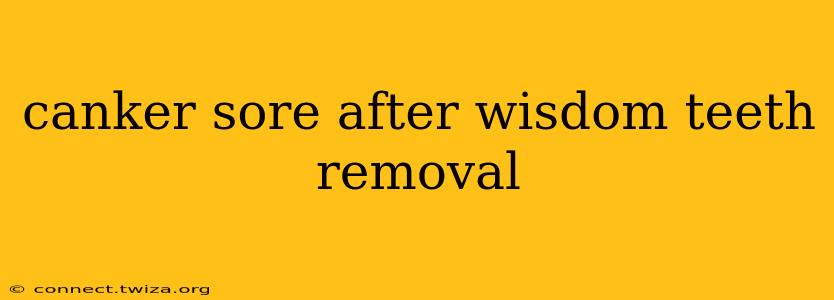Wisdom teeth removal is a common oral surgery, but the recovery process can be uncomfortable. One potential complication that many patients experience is the development of canker sores. These painful, small ulcers inside the mouth can significantly impact your comfort and ability to eat and drink during your healing period. This comprehensive guide explores the connection between wisdom teeth removal and canker sores, offering insights into causes, prevention strategies, and effective treatment options.
What Causes Canker Sores After Wisdom Teeth Removal?
Several factors contribute to the increased likelihood of developing canker sores after wisdom teeth extraction:
-
Trauma to the Mouth: The surgical procedure itself causes trauma to the soft tissues in your mouth. This disruption of the oral mucosa can create a susceptible environment for canker sores to develop. The healing process often involves inflammation, making the area more prone to irritation.
-
Irritation from Braces or Other Appliances: If you have braces or other orthodontic appliances, these can rub against the surgical site and exacerbate the irritation, increasing the risk of canker sore formation.
-
Changes in Oral Flora: Wisdom teeth removal can temporarily disrupt the balance of bacteria in your mouth. This imbalance can create an environment conducive to the development of canker sores.
-
Stress: The stress associated with surgery and recovery can also contribute to canker sore outbreaks. Stress weakens the immune system, making you more vulnerable to infections.
-
Medications: Some pain relievers or antibiotics prescribed after surgery can have side effects that increase your susceptibility to canker sores.
-
Poor Oral Hygiene: Neglecting oral hygiene following surgery can worsen the healing process and dramatically increase the risk of developing canker sores.
Why Do I Keep Getting Canker Sores After Wisdom Teeth Removal?
Recurring canker sores after wisdom teeth removal can be frustrating. This often points to underlying contributing factors that haven't been addressed. Consider these possibilities:
- Incomplete Healing: If the surgical site isn't fully healed, the ongoing irritation can continuously trigger canker sore formation.
- Underlying Medical Condition: Conditions like immune deficiencies or vitamin deficiencies can predispose individuals to recurrent canker sores.
- Continued Irritation: Prosthetic devices, poorly fitting dentures, or even persistent habits like biting your cheek could continue to irritate the area.
How Can I Prevent Canker Sores After Wisdom Teeth Removal?
Proactive measures are crucial in minimizing the risk of developing canker sores:
- Maintain Excellent Oral Hygiene: Gently brush and floss your teeth, but avoid the surgical site for the first few days as instructed by your dentist or oral surgeon. Use a soft-bristled toothbrush.
- Rinse Regularly with Salt Water: A warm saltwater rinse (1/4 to 1/2 teaspoon of salt in 8 ounces of warm water) can help clean the surgical area and reduce inflammation.
- Follow Your Surgeon's Instructions: Adhere strictly to your surgeon's post-operative instructions, including any prescribed medication and dietary recommendations.
- Eat Soft Foods: Avoid hard, crunchy, or acidic foods that can irritate the surgical site and potentially trigger canker sores.
- Stay Hydrated: Drinking plenty of water helps keep your mouth moist and promotes healing.
- Manage Stress: Engage in stress-reducing activities, like yoga or meditation, to support your immune system.
What are the Best Treatments for Canker Sores After Wisdom Teeth Removal?
If you do develop a canker sore, several effective treatment options are available:
- Over-the-Counter Medications: Topical anesthetics like benzocaine can numb the area and provide temporary relief. Antiseptic mouthwashes can help keep the area clean.
- Prescription Medications: Your dentist or oral surgeon may prescribe stronger pain relievers or topical corticosteroids to reduce inflammation and pain.
- Home Remedies: Some home remedies, like applying ice to the affected area or using a baking soda paste, may offer mild relief. However, consult your dentist before using any home remedies.
Can I Use Mouthwash After Wisdom Teeth Removal to Prevent Canker Sores?
Yes, using a gentle, alcohol-free mouthwash can be helpful after wisdom teeth removal, but always follow your oral surgeon’s instructions. Some mouthwashes can irritate the healing tissues. A salt water rinse is generally recommended in the initial days. Avoid using mouthwash with alcohol as it can further dry out the mouth and delay healing.
How Long Do Canker Sores Last After Wisdom Teeth Removal?
The duration of canker sores varies. Typically, they heal within 7-10 days. However, larger or more severe sores might take longer. If a canker sore persists for more than two weeks, or if you experience increased pain, swelling, or other concerning symptoms, consult your dentist or oral surgeon immediately.
This information is for general knowledge and does not constitute medical advice. Always consult with a qualified healthcare professional for any health concerns or before making any decisions related to your health or treatment.
